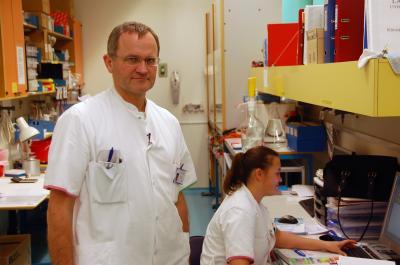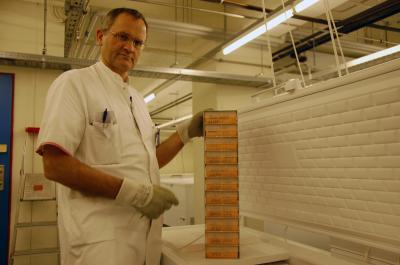Lifestyle can affect cellular aging
The recent "Copenhagen General Population Study" involved almost 20,000 people, some of which were followed during almost 19 years, and the conclusion was clear: If the telomere length was short, the risk of heart attack and early death was increased by 50 and 25 per cent, respectively.
"That smoking and obesity increases the risk of heart disease has been known for a while. We have now shown, as has been speculated, that the increased risk is directly related to the shortening of the protective telomeres - so you can say that smoking and obesity ages the body on a cellular level, just as surely as the passing of time," says Borge Nordestgaard.

In an ongoing study of almost 20,000 Danes, a team of researchers from the University of Copenhagen have isolated each individuals DNA to analyze their specific telomere length a measurement of cellular aging. The conclusion was clear: If the telomere length was short, the risk of heart attack and early death was increased by 50 and 25 percent, respectively.
Professor Borge Nordestgaard explains the study and the breakthrough results.
Read the full University of Copenhagen press release:http://news.ku.dk/all_news/2012/2012.2/cellular-aging-increases-risk-of-heart-attack/
(Photo Credit: s: Speak: Henrietta von Schilling. Camera: Carl Hagman and Tue Nielsen. Production: Tue Nielsen and Lasse Foghsgaard, Experimentarium.)
One in four Danes has short telomeres
The study also revealed that one in four Danes has telomeres with such short length that not only will they statistically die before their time, but their risk of heart attack is also increased by almost 50 per cent.
"Future studies will have to reveal the actual molecular mechanism by which the short telomere length causes heart attacks," says Borge Nordestgaard, and asks, "Does one cause the other or is the telomere length and the coronary event both indicative of a third - yet unknown - mechanism?"
Another possible prospect of the study is that general practitioners could conduct simple blood tests to reveal a person's telomere length and thereby the cellular wear and age.

This is Clinical Professor of Genetic Epidemiology Borge Nordestgaard from the University of Copenhagen. Professor Nordestgaard is also a chief physician at Copenhagen University Hospital, where he and colleagues conduct large scale studies of groups of tens of thousands of Danes over several decades.
(Photo Credit: University of Copenhagen)

This is Clinical Professor of Genetic Epidemiology Borge Nordestgaard from the University of Copenhagen. Professor Nordestgaard is also a chief physician at Copenhagen University Hospital, where he and colleagues conduct large scale studies of groups of tens of thousands of Danes over several decades.
(Photo Credit: University of Copenhagen)
Source: University of Copenhagen